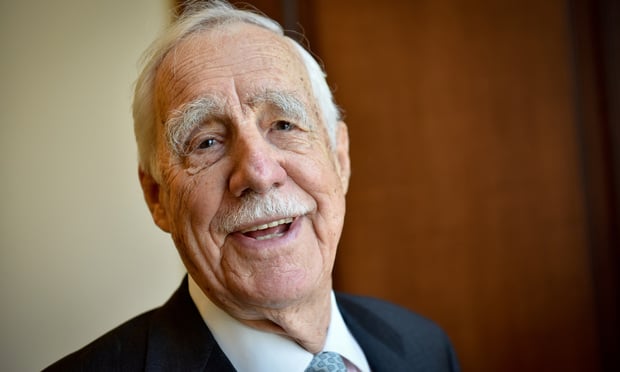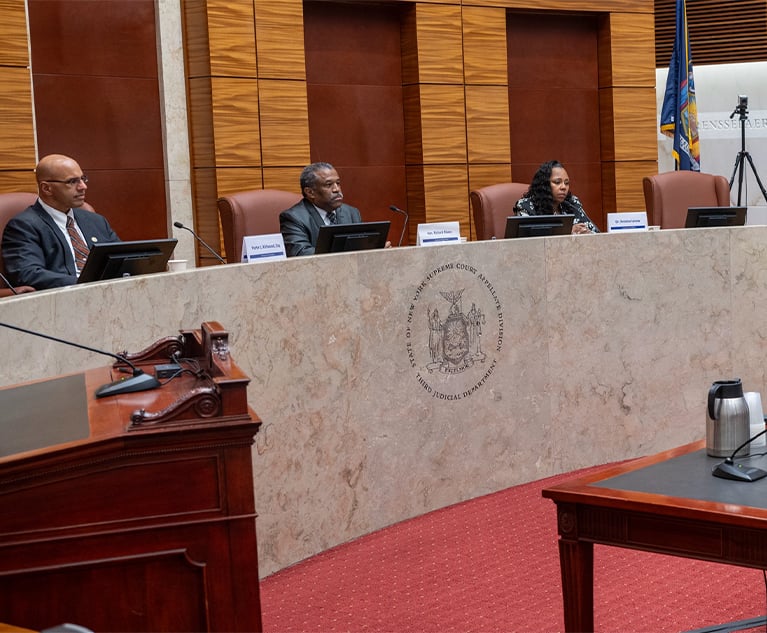SDNY Mourns Passing of 'Role Model' Judge Robert Sweet at 96
In a letter to colleagues, Chief Judge Colleen McMahon praised the intellect and wit of Judge Sweet, who passed away at his home in Idaho.
March 25, 2019 at 04:50 PM
3 minute read
 Judge Robert Sweet. Photo by David Handschuh/NYLJ
Judge Robert Sweet. Photo by David Handschuh/NYLJ
The Southern District of New York mourned the loss of one of its own Monday, as personnel at the courthouse learned of the death of U.S. District Judge Robert Sweet over the weekend. He was 96 years old.
In a note to colleagues, Chief Judge Colleen McMahon said Sweet passed away “suddenly and quietly” in his sleep at his ski home in Sun Valley, Idaho.
“If ever there was a man of whom it could be said, 'He lived until he died,' it was Bob Sweet,” McMahon wrote.
Sweet, who's served in a senior status at the court since 1991, had been cracking jokes at a senior judges' committee meeting less than two weeks ago, according to McMahon, who noted he was hard at work on dozens of cases at the time of his passing.
An avid figure skater, McMahon said Sweet had “quite recently” been spotted at an ice skating rink by a friend.
“Sharp of mind, quick of wit and irrepressibly full of life, he will and should be the role model for us all,” she wrote. “Let us remember with affection and no little wonder this most amazing of men and dedicated of judges.”
Sweet joined the federal bench in April 1978, after being nominated by President Jimmy Carter. A Yonkers native, he served in the navy during World War II, and joined the Manhattan U.S. Attorney's Office in 1953.
During the administration of former New York City Mayor John Lindsay, Sweet served as executive assistant to the mayor before becoming deputy mayor from 1966 to 1969, where he helped handle unrest over the administration of the city's school system.
After departing City Hall, Sweet became a partner at Skadden, Arps, Slate, Meagher & Flom ahead of his nomination by Carter.
As a judge, Sweet made his opposition to the policing and sentencing regimes under the so-called war on drugs. In 1988, he declared the federal sentencing guidelines for drug offenses unconstitutional, only to have the U.S. Court of Appeals for the Second Circuit reverse his decision.
“The idea of using the criminal law to deal with something which is basically a health problem, basically an education problem, I think that that's a bad mistake in public policy,” Sweet said in a 1999 interview. “But then when you heighten that with the draconian penalties, which we've had since 1984 and seem to be increasing, that just makes the situation worse.”
Despite his long-standing senior status, Sweet continued to take part in high-profile cases. In 2005's New York Times v. Gonzales, for example, the judge allowed the newspaper to keep phone records for reporter Judith Miller out of reach from federal prosecutors at the height of the war on terror. The Second Circuit ultimately reversed Sweet's decision.
Sweet was handling one of the civil lawsuits against former Hollywood mogul Harvey Weinstein in the Southern District at the time of his death, along with a number of other cases.
Information on funeral arrangements was not immediately available.
Related:
Still Serving: Southern District Judge Robert Sweet
Federal Judge Dismisses Harassment Claims Against Ex-Cuomo Administration Official
Weinstein Seeks Appellate Review of Order Allowing Sex Trafficking Charges
This content has been archived. It is available through our partners, LexisNexis® and Bloomberg Law.
To view this content, please continue to their sites.
Not a Lexis Subscriber?
Subscribe Now
Not a Bloomberg Law Subscriber?
Subscribe Now
NOT FOR REPRINT
© 2025 ALM Global, LLC, All Rights Reserved. Request academic re-use from www.copyright.com. All other uses, submit a request to [email protected]. For more information visit Asset & Logo Licensing.
You Might Like
View All

Law Firms Expand Scope of Immigration Expertise Amid Blitz of Trump Orders
6 minute read
'Reluctant to Trust'?: NY Courts Continue to Grapple With Complexities of Jury Diversity
Trending Stories
- 1Uber Files RICO Suit Against Plaintiff-Side Firms Alleging Fraudulent Injury Claims
- 2The Law Firm Disrupted: Scrutinizing the Elephant More Than the Mouse
- 3Inherent Diminished Value Damages Unavailable to 3rd-Party Claimants, Court Says
- 4Pa. Defense Firm Sued by Client Over Ex-Eagles Player's $43.5M Med Mal Win
- 5Losses Mount at Morris Manning, but Departing Ex-Chair Stays Bullish About His Old Firm's Future
Who Got The Work
J. Brugh Lower of Gibbons has entered an appearance for industrial equipment supplier Devco Corporation in a pending trademark infringement lawsuit. The suit, accusing the defendant of selling knock-off Graco products, was filed Dec. 18 in New Jersey District Court by Rivkin Radler on behalf of Graco Inc. and Graco Minnesota. The case, assigned to U.S. District Judge Zahid N. Quraishi, is 3:24-cv-11294, Graco Inc. et al v. Devco Corporation.
Who Got The Work
Rebecca Maller-Stein and Kent A. Yalowitz of Arnold & Porter Kaye Scholer have entered their appearances for Hanaco Venture Capital and its executives, Lior Prosor and David Frankel, in a pending securities lawsuit. The action, filed on Dec. 24 in New York Southern District Court by Zell, Aron & Co. on behalf of Goldeneye Advisors, accuses the defendants of negligently and fraudulently managing the plaintiff's $1 million investment. The case, assigned to U.S. District Judge Vernon S. Broderick, is 1:24-cv-09918, Goldeneye Advisors, LLC v. Hanaco Venture Capital, Ltd. et al.
Who Got The Work
Attorneys from A&O Shearman has stepped in as defense counsel for Toronto-Dominion Bank and other defendants in a pending securities class action. The suit, filed Dec. 11 in New York Southern District Court by Bleichmar Fonti & Auld, accuses the defendants of concealing the bank's 'pervasive' deficiencies in regards to its compliance with the Bank Secrecy Act and the quality of its anti-money laundering controls. The case, assigned to U.S. District Judge Arun Subramanian, is 1:24-cv-09445, Gonzalez v. The Toronto-Dominion Bank et al.
Who Got The Work
Crown Castle International, a Pennsylvania company providing shared communications infrastructure, has turned to Luke D. Wolf of Gordon Rees Scully Mansukhani to fend off a pending breach-of-contract lawsuit. The court action, filed Nov. 25 in Michigan Eastern District Court by Hooper Hathaway PC on behalf of The Town Residences LLC, accuses Crown Castle of failing to transfer approximately $30,000 in utility payments from T-Mobile in breach of a roof-top lease and assignment agreement. The case, assigned to U.S. District Judge Susan K. Declercq, is 2:24-cv-13131, The Town Residences LLC v. T-Mobile US, Inc. et al.
Who Got The Work
Wilfred P. Coronato and Daniel M. Schwartz of McCarter & English have stepped in as defense counsel to Electrolux Home Products Inc. in a pending product liability lawsuit. The court action, filed Nov. 26 in New York Eastern District Court by Poulos Lopiccolo PC and Nagel Rice LLP on behalf of David Stern, alleges that the defendant's refrigerators’ drawers and shelving repeatedly break and fall apart within months after purchase. The case, assigned to U.S. District Judge Joan M. Azrack, is 2:24-cv-08204, Stern v. Electrolux Home Products, Inc.
Featured Firms
Law Offices of Gary Martin Hays & Associates, P.C.
(470) 294-1674
Law Offices of Mark E. Salomone
(857) 444-6468
Smith & Hassler
(713) 739-1250







